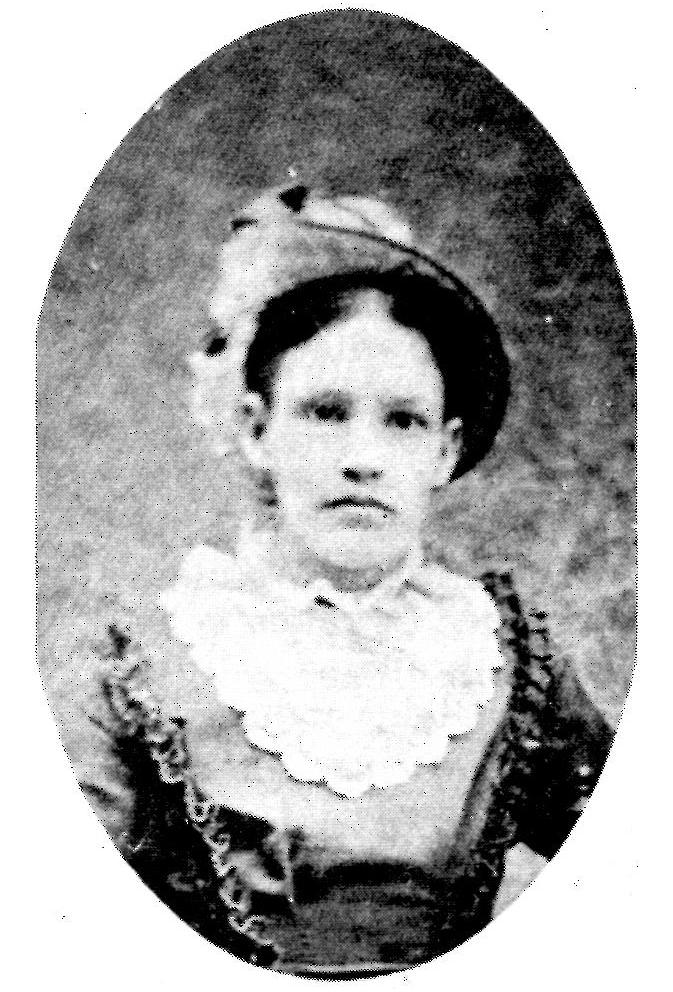
This sketch of the Edwin Whiting family was written and read at a reunion by Verona [Mary Verona Snow], wife of Charles Whiting, who was a son of Edwin & Mary E. Cox Whiting. Aunt Verona was with grandmother on the trip to Springville from Arizona when Aunt May died. These excerpts give a view of Mary Cox Whiting.
Our ancestor Edwin Whiting, [one of] the first of the Whitings to join the Church, was a grand, old man. The old Whiting Home was in Springville, it was a two story building. I imagine it was one of the nicest in those early days. This was a great place for young people to meet and I guess our father must have been very tolerant, because I never heard of any complaint from him. I have heard his sons tell of some of his sayings when they were among themselves. One of them was when they were riding along and one of the boys driving slashed the whip around and accidently struck father on the ear. He exclaimed, “Judas!! Cut and slash, Cut and slash, Cut a man’s ear off!” They were sorry but they always saw the finny side of things. This is only one of the sayings among hundreds that they would tell among themselves and laugh and have a good time. Albert and the boys had been out late one night and Father Whiting was having a hard time to get them up, when someone asked if the boys were up yet and he said, “Well, I got Albert up on his haunches, but I suppose he has laid down by now.”
He lived in Manti, San Pete County for 12 years when they first came to Utah, where most of their children were born. He was a horticulturist or nursery man, a lover of beautiful flowers and cultivated many fruits: growing them from the seed and pits. These were grafted when they were old enough. I have seen three kinds of apples growing on one tree.
The winters were so cold in Manti that things would winter kill, so he was advised to move to Springville where the climate was more moderate.
It was here in Springville that our sister May was born May 5, 1862. Her childhood days were happy ones until the time came when she was budding intro womanhood and she contracted a severe cold, which wrecked her health. Dropsy and heart trouble were the result. Never can I forget the suffering of that sweet patient girl and the untiring devotion of that sweet sainted mother, who watched over her day and night. (This was my mother- in-law [Mary Elizabeth Cox]). I know she was one of the best women that God placed on the earth. She was ever kind and a peacemaker. “Blessed are the peacemakers for they shall inherit the earth.”
I loved her as my own mother. My husband Charles Whiting was called on the Arizona Mission in 1896 and in 1898 we returned to Springville for the summer. May’s Dr. had recommended a change of climate, so when we returned in the fall, it was decided that Grandma and May go with us. The unmarried sons Edgar, Edward Arthur, John and Fred, and the two Richardson boys, Edmund and Sully, orphans and friends of our boys were with us too making quite a company.
On our way one night we camped by a pasture. After we had gone to bed a woman came to our camp complaining to the boys her fence was down and she was afraid our horses would get in on her land. She was quite riled up. After she left, Grandma said if she came again, she would talk to her.
Early next morning the boys saw her coming. They began calling Grandma. Edmund said, “Hurry Aunt Mary the Old Hag is coming.” Grandma talked to her and won her over. She left feeling all right.
We reached our destination in due time. Six weeks on the way. May’s health greatly improved. For four years she seemed to enjoy life. She took parts in plays and entertainments and was so sweet and jolly. I remember one time when she and John were scuffling like all children do, and he accidently scratched her on the wrist and she said, “All right old cat, go off and eat the meat you have got.” That shows she was full of jokes, too. She felt well until the year the railroad came thru Arizona at Winslow, as they called it. Here the Round house was built. Merchants came and established stores in tents until they could throw up something better. May, during the Xmas holidays went with some of our family to purchase goods; and caught cold, and was never well again. Edwin M. Whiting went with us. This was the beginning of his store. And he kept it until he was too old to run it. Then turned it over to Eddie who still runs it. (1931 or 2)
When Spring came, Grandma and all of us thot it best to take May back to a Dr. as soon as possible. We formed a company of four teams and four wagons. Our compny consisited of the following. May, Grandma, Edgar, Arthur. John, Fred and Henry and Harriet Curtis and Children. Hattie, Dora, Joseph, Mary, Milton and Clara. Harriet was Mary’s older sister. I myself and two Children Pearl and Alice were along. Also Bro. And Sister Adams and their daughter Fannie Merrill. These later ones were on their way to St. George and how thankful we were to have them along with us in our trouble.
Never will I forget we reached House Rock. We drove along all day, so anxious were we to get there. For it seemed any minute might be May’s last. She could not lie down without smothering. It would break your heart to her every little while exclaim, “Oh, in this lonely wilderness! I wish I were home. Oh! in this lonely desert.” I am sure that she knew her time was short. Finally we reached House Rock. A family by name of Adair lived there. Surely the Lord raised up friends unto us. They were lovely people and did everything they could to help us. It was a haven of rest for poor May. The company camped down a little way in the cedars and pinion pines. Sister Adams, myself and Grandma helped to nurse May. Harriet not being very well stayed at camp with her children, Clara being the baby.
Bro. Adair rode on horseback to Kanab for a Dr. who arrived next morning at daybreak. When he looked at May he said, “I think that she is a poor sufferng girl.” We knew then he had no hopes. He prepared a medicine for her. She sat on the couch talking leaned back on the pillows and was gone.
We had persuaded Grandma to lie down before the Dr. came. I went to call her, “May is dying” I said. How could I tell her she was already dead.
I was weeping and taking on, so instantly she began to comfort me. Saying, “Don’t weep; let us let her go in peace.” And if she ever shed a tear, I don’t remember it. Although I knew her heart was breaking. This is one of characteristics, her quiet mature and self dominant resignation. It was not what will we do. But rather what can we do?
Brother Adair happened to have some lumber from which they made a coffin, from which was a nice roomy box. Grandma had some bleached muslin which we used to line the box inside and out.
We had no lace or trimmings, but some of you remember when we were young, we cut out paper laces. Well, I took some of the muslin and cut in strips of six in. wide, then I cut callops on one edge, the small notches around the scallops, then a design in each scallop. This we pleated all around the inside of the coffin. We made her a choice bed with her own choice pillow. She was dressed in her own endowment robes (she had been to thru the Temple). We placed her in her coffin and she looked as if she were asleep. Grandma remarked that she looked more comfortable there than crowded in a casket. I feel as if this all had to happen. That there was a greater mission for on the other side.
Never will I forget that sad funeral. Two sons of Bishop Stewart of Kanab were there. They had to come to round up some horses. I know the Heavenly Father had sent them. I believe her brothers dug the grave. They carried her upon the mound at foot of those Beautiful cliffs and buried her just as the sun went down. Brother Adair dedicated her grave. This was the saddest funeral I ever witnessed.
When our company pulled out next morning, leaving the lonely grave of our loved one, never a thot was given but what her body would later be brot to Springville her birthplace. But Pres. Joseph F. Smith advised them that she be not disturbed. “In his letter to Grandma, for she wrote him, he said, Sister Whiting, That is a hallowed spot and God and the Angels watch over it. When the trumpet sounds she can come from there as easy as any where else.
Bertha Klinman expresses the thot in her poem “The Shrine in the Desert Wasteland.”
Thru years of experience I have at last learned to love the desert. There is something about it that I never seem to fathom.
This is given as correctly as I can remember it. The scene of May’s death is just as vivid as tho it happened yesterday. But data and time I am not sure. There is no one living who was there except Edgar, John who was a little boy Fannie Merrell, Hattie Evans may be all (rest of line unreadable) something about it.
In the fall my husband came back to get me. He was accompanied by Sully Richardson and wife and as we came back we brot pickets and paint. We put up a nice fence around May’s grave and painted it. Uncle Orville Cox, Grandma’s brother was a stone cutter and he had cut a rock slab and placed an inscription on it. It was there when we put the picket fence up and is still here. This lonely grave has been visited by many people.
Aunt Verona
I want to add a little here. Grandma wanted this put on her tombstone. “Thrice Blessed May Rest thou in Peace. She was born in May, Named in May and died in May.”
To anyone going thru to Arizona and if they have a desire to find the grave the place is just about 4 ½ or five miles back up the valley after you get down in the valley from the Kihbab Forest. The road no longer comes thru House Rock Valley. There is a nice clear spring which has been piped down to the ranch and service Station. The water was very good and cold. I will never forget the three days spent there with our relatives when we put the new marker on the grave.
Several years later Marie and Harold took daddy and I there and after a lot of hunting we found it. It is indeed a lonely spot.
Here is something Uncle Edgar had to say:
There were four boys along on that trip when we started back to Utah with May, whose health was so bad and we thot we could get her to a Dr. It was such a long trip thru the desert land. We had to be ferried across the Big Colorado River at Lee Ferry and were 10 or 12 miles our when some of our horses gave out and we were forced to leave some of the boys behind while Mother Verona Harriets family and I hurried onto House Rock valley where a family by name of Adair lived. May was so sick.
The morning after we arrived Br. Adair went to Kanaab on Horseback for a Dr. who arrived next morning about seven only a few hours before May died. We were anxious to get her to a settlement to burry her But the Dr. said she was too bloated to be moved and it was a full day’s drive.
We went to work and made a rough coffin. We used boards from our wagons and some Br. Adair had. Henry Curtis Bro Adams and wife helped us to give her as good a burial as possible. Some of the people blame us boys for not moving her. But Mother was against it so we left her here.
(Transcribed from a handwritten letter from the Marie J. Whiting Collection by James W. Whiting, April 2006. Original spelling and punctuation retained. Some parts of the story are difficult to read. Readers with better copies are invited to correct this transcription. May was born May 5, 1862 and died May 15, 1882.)
Photograph and Headstone of May Whiting, House Rock, Arizona
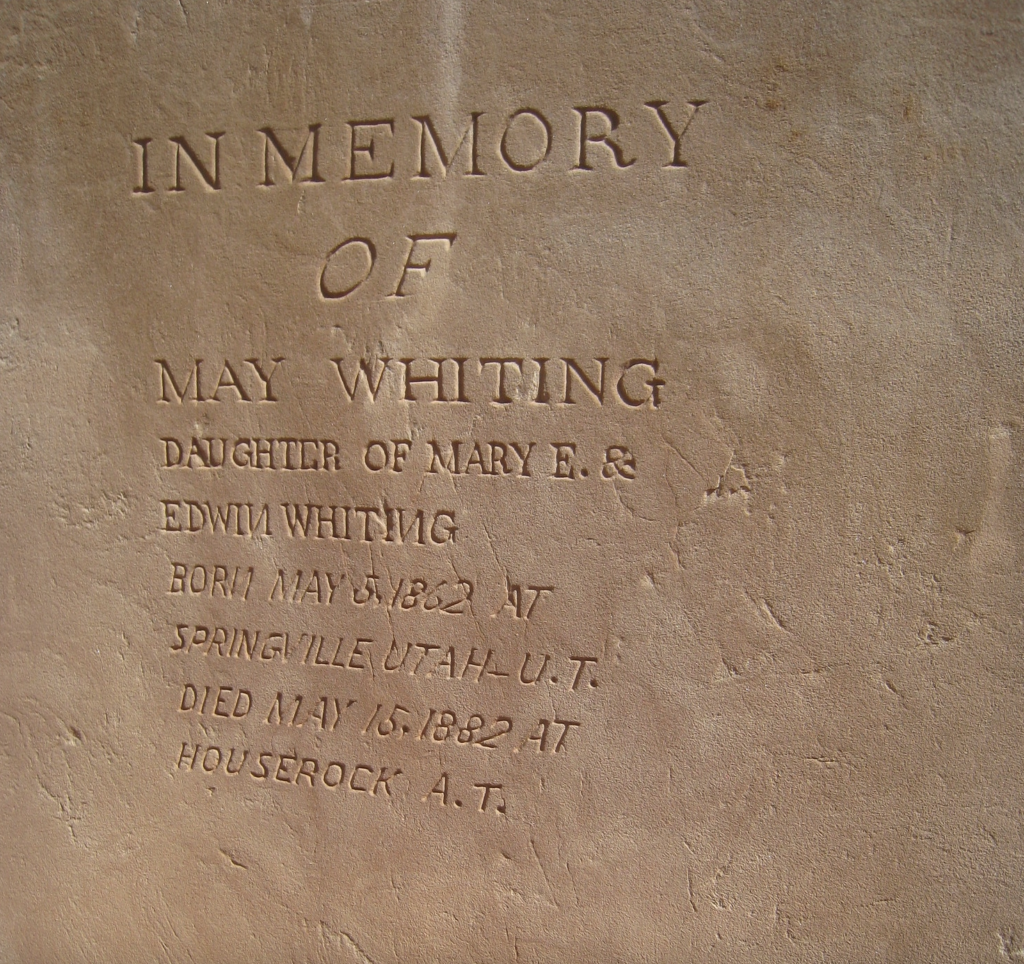
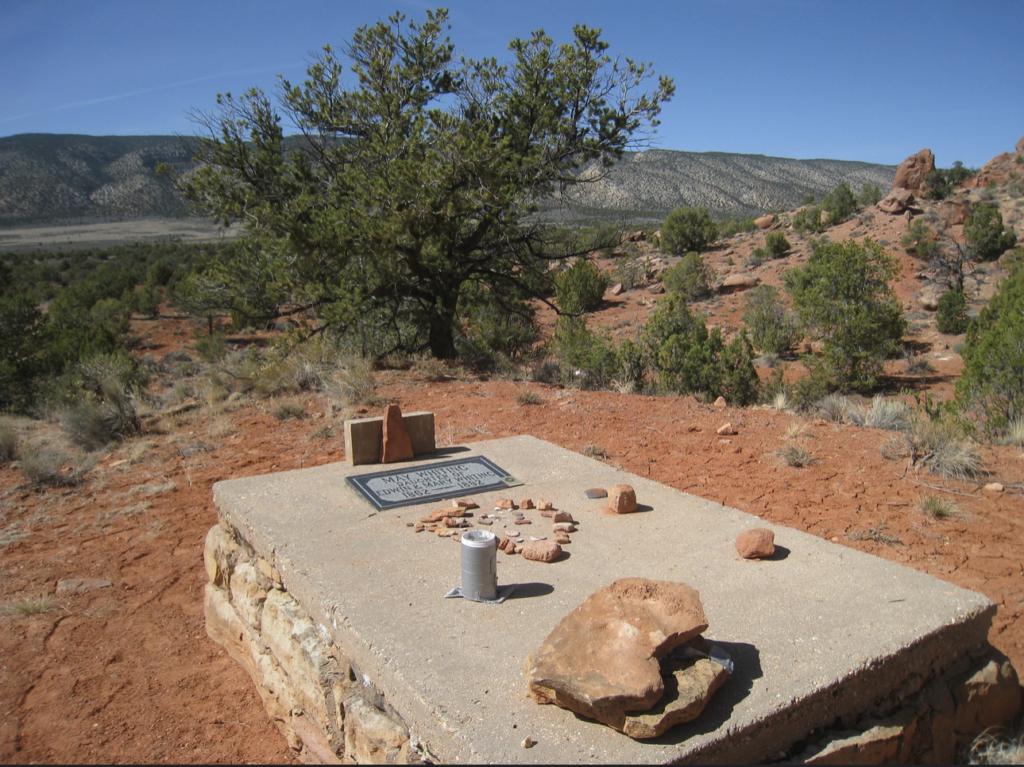

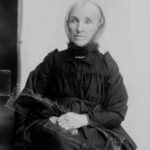
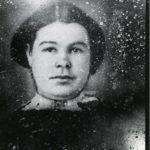
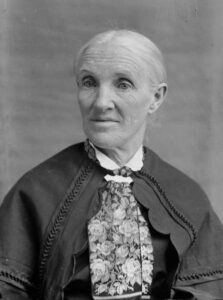
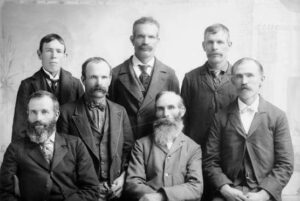
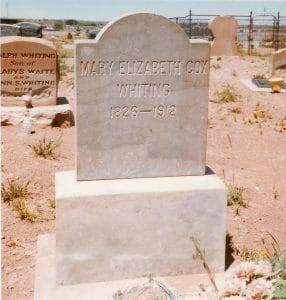
No comment yet, add your voice below!